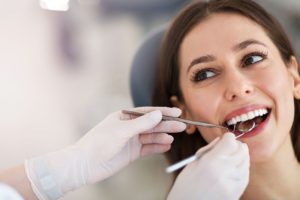As soon as we start to grow our first baby teeth, we begin to visit the dentist for regular dental care. But when we get older, our schedules become busier. It may be tempting to skip these routine visits to the dentist’s office to avoid the hassle.
Missing this preventative dentistry can put your smile at risk of major dental problems. But how crucial is this dental work when it comes to the look and feel of your smile? Read on to learn more about what routine dental care your dentist can provide you to preserve your oral health.

Why Do I Need Regular Dental Check-Ups?
When you visit your dentist for a routine dental check-up, they will thoroughly clean your teeth. Though you brush and floss your teeth at home, your usual oral hygiene regimen cannot reach certain spots of your mouth. So plaque might linger in some areas, including close to the gumline.
The dentist scrapes away plaque and tartar build-up so that it will not eat away at your tooth enamel and put your dental health at risk. They will then examine your teeth and gums for signs of potential issues.
Early stages of gum disease and cavities do not always have noticeable symptoms. But your dentist can find these problems and offer swift treatment before they can worsen and cause major damage to your smile. These appointments also provide good opportunities for you to ask questions about your oral health and discuss any goals you might have for your smile.
How Often Should I Schedule Routine Dentist Appointments?
The average dental patient should schedule these routine dentist appointments every six months. This establishes the perfect window to remove harmful residues and treat dental issues before they can significantly harm your smile.
But some patients might need to see their dentist more frequently. For instance, senior patients, people with a higher propensity for tartar formation, and those with underlying medical concerns may need to visit their dentist’s office three or four times a year. Your dentist will evaluate your smile and work with you to find the best preventative dentistry plan for your needs.
What Should I Do During a Dental Emergency?
Even with diligent preventative and routine dental care, accidents might happen that threaten your oral health. If you notice a problem with your teeth or gums, do not wait until your next regular check-up to talk to your dentist. You can call your dentist about any questions or concerns with your smile, especially if you feel pain or discomfort.
Your dentist might ask you to attend an emergency dentist appointment for a prompt evaluation of the potential problem. They can diagnose the issue and give you urgent treatment to get your smile looking and feeling its best again. Even if you do not feel pain, you should contact your dentist to amend any issues because they may worsen without swift dental intervention.
